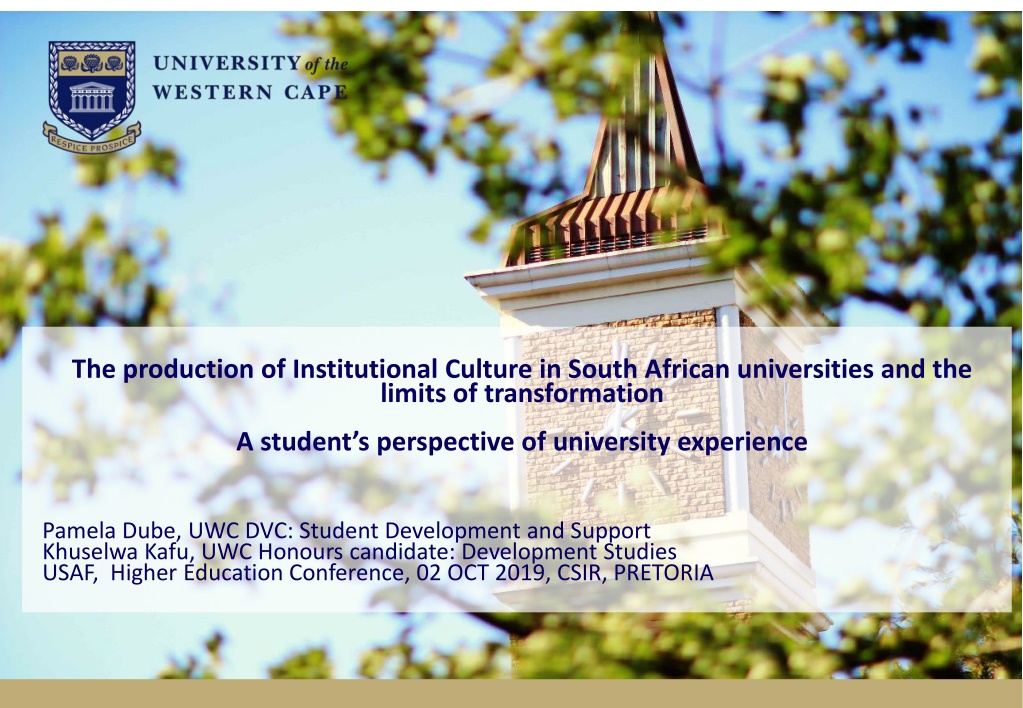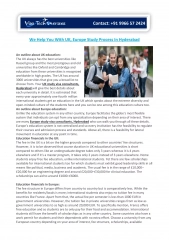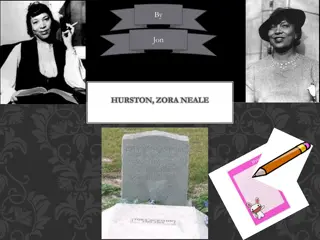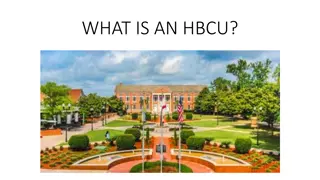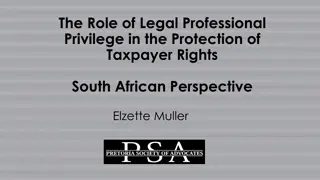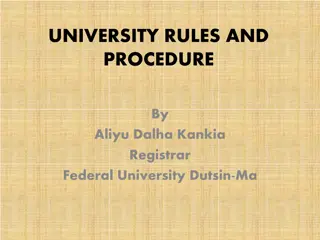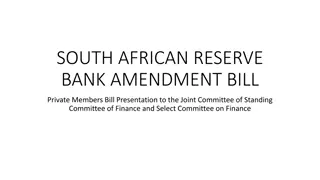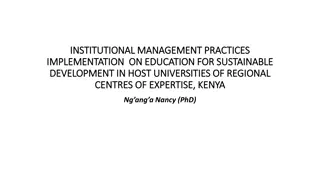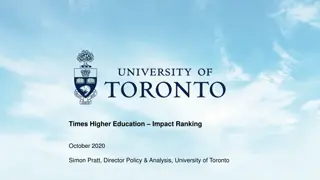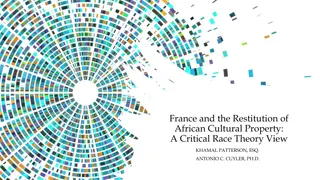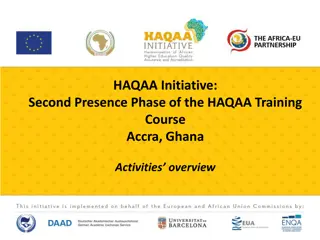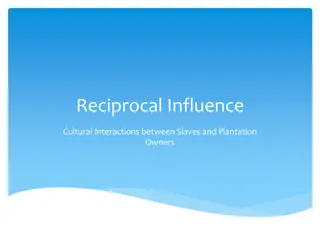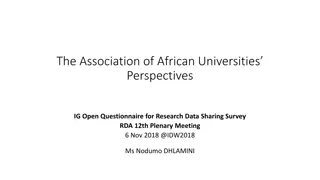The Institutional Culture of South African Universities from a Student's Perspective
Exploring the production of institutional culture in South African universities and the challenges faced by students, particularly in terms of access, equity, poverty, and academic support. Collaboration among university stakeholders is crucial for addressing social justice issues and ensuring student success in a changing organizational context.
Download Presentation

Please find below an Image/Link to download the presentation.
The content on the website is provided AS IS for your information and personal use only. It may not be sold, licensed, or shared on other websites without obtaining consent from the author. Download presentation by click this link. If you encounter any issues during the download, it is possible that the publisher has removed the file from their server.
E N D
Presentation Transcript
The production of Institutional Culture in South African universities and the limits of transformation A student s perspective of university experience Pamela Dube, UWC DVC: Student Development and Support Khuselwa Kafu, UWC Honours candidate: Development Studies USAF, Higher Education Conference, 02 OCT 2019, CSIR, PRETORIA
CONTEXT INSTITUTIONAL GOVERNANCE & RELATED STRUCTURES MONITORING TRANSFORMATION Council Senate Institutional Forum Student governance Student Consultative forum Convocation Employment Equity Forum &/ or Transformation Oversight Committee NATIONAL HE LEGISLATIVE FRAMEWORK & PLANS NCHE, 1996, Co-operative Governance Model TRANSFORMATION HE ACT, 1997 , Ministerial interventions White Paper, 1997, Reaffirms transformation, equity, redress HE Plan, 2001, Steering for efficiency & effectiveness INSTITUTIONAL CULTURE Structures & processes that execute decisions by governance structures Positions, offices and formal roles AND STUDENT VOICE Structures & processes through which individuals seek to influence decisions
Outline Access and Equity Inclusivity Academic support and Co-curriculum experience Health and Wellness Safety and security
University as an organisation in a changing context Universities are made up of different stakeholders, as such, each stakeholder has a distinct experience. Students are the largest stakeholders and the main reason why universities exist. The success of a university is determined by the type of citizens it produces and their involvement in the community and the society at large It is important to ensure there is collaboration between all university stakeholders to realize the success of the university as a whole and in particular student success. These collaborations should aim to champion issues relating to social justice challenges, especially in relation to access and equity of participation, poverty, health and wellness, academic support, inclusivity and gender based violence.
Access and Equity Given our historic context as a country the issue of access and parity of participation and equity is very important and universities should never lose sight of that UWC, for instance , from this context is widely known as the university of the left and prides itself on attracting a significant number of black students, many of whom are first generation university entrants who come from humble beginnings. These students face a number of challenges relating to their financial positions, and UWC is one of those so called historically disadvantaged universities that has a relatively low fee structure. Students come to university with challenges of poverty which precede their university experience, challenges such as : food insecurity, exposure to violent crimes and assault, mental health, inability to purchase study materials, pay tuition and/or boarding fees and access health facilities. Whilst most universities have implemented a number of strategies in order to assist students with such challenges, however, there is more to be done especially in the area of promoting student agency and allowing students to utilise their talents (given all the growing access to technological advances) and finding solutions to their problems For instance, there are no sufficient opportunities and investments for students to create an income through entrepreneurial activities.
Inclusivity The university, just as society is constantly changing, yet university structures remain the same regardless of their effectiveness or lack thereof. Sound student government and leadership are essential for transformation as they provide a platform for the student voice. Student governance is part of democratic socialization of students, however, party-politic interests limit the exercise of this democracy and creates division in the student population. The top down decision making the university exercises robs it from holistic growth and development of innovative ideas to solve today s problems. Continued visible divisions between not just students and management but even between the leadership and the academics/ professional and support staff. There s a need for more institutional engagement , beyond the council, senate and related statutory structures but in form of across- campus conversations like in a town hall bringing the university leadership, students, staff together (not just emails and online communication!) Our university consults widely on new strategy next university strategy (IOP) consultations are due to start this year but should go beyond just focus groups
Academic Support and Co-Curricular Experience Most universities currently have a system of excluding students academically based on poor academic performance, however , there are no clear processes or mechanisms in place to establish and record factors that contribute to this performance. Universities still seem to lack sufficient systems of assisting students with the transition from high school to university, and yet as custodians of knowledge and some with Education Faculties producing teachers or the school system, they should be part of the solution to the school system s failure to prepare learners for university. They still seem to lack strategies for adequately addressing the high dropout and failure rates. While I will not delve into curriculum reform in this talk, I do want to emphasise the need for serious reflections on curriculum review if we are having serious discussions about designing higher education for the future There s much going on around the 4IR and career readiness, but more importantly we need to look at readiness of the academics, the support staff members preparing the students for the 4IR we need the resources, - access to the resources as well as effective, technologically savvy , open minded people ready to work with/ teach us. Co-curricular experience programmes preparing for career readiness, and career counseling
Health and Wellness Most universities have a health centre that consist of a clinic and others even have counselling services to address mental health. With growing challenges of mental health wellness consideration for more resources should be made. At UWC, there are only 6 qualified Psychologists serving over 20 000 students, which means, there are long waiting lists and the use of Psychology interns and 24 hour access to SADAG not adequate. Consideration for faculty based professional counselling. The clinic offers medical services at a fee, which means, those who do not have a medical aid or financial ability to cover the bill cannot be assisted. The inability to access health facilities on campus affects the student experience negatively, as it creates more challenges that impact student performance negatively.
Security ad Safety Security and safety, ranging from violent crimes to issues of Gender Based Violence, forms part of a national crisis that universities cannot afford to ignore recent incidents have led to universities being accused of not caring for its students in this regard & limiting their spaces of involvement only to university premises. Our university has structured a sexual harassment policy yet the implementation and education of how it works has been slow in reaching the whole university. Universities needs to treat issues of security and safety, especially GBV as a crisis and should develop collaborative structures that deal directly with everything GBV
To consider going forward. Student agency : Develop a space for student entrepreneurs to trade on campus at least once a month and reduce the amount of red tapes in the process of becoming a university vendor. Mental Health wellness : Develop online platforms for student counselling support offer alternatives of dealing with depression while waiting for the waiting list to clear. Inclusivity : Universities need to review role of SRCs and the growing divisive political interests and provide platforms for the diversity of student voices and ensure that the SRC is representative of the University s demographic Academic support: Needs to create mechanisms to profile students, identify at risk students, for instance conduct surveys that accompanies the academic exclusion processes in order to learn the problem and be better able to create solutions. Safety and Security : In relation to GBV, in particular there are number of efforts in place across universities ( there are transformation offices, at UWC we have the GEU ), and despite all the policies, first responder training processes and so on, students and staff still find it difficult to report instances of GBV, why? Universities need dedicated efforts in form of an office, persons that will keep the institution vigilant, guide and address GBV matters, co-ordinate workshops relating to GBV and support students in this regard, this office could develop an online platform that allows students to report their cases. As we work towards shaping universities for the future to not leave out the student voice
Discussion Thank you Enkosi Dankie
